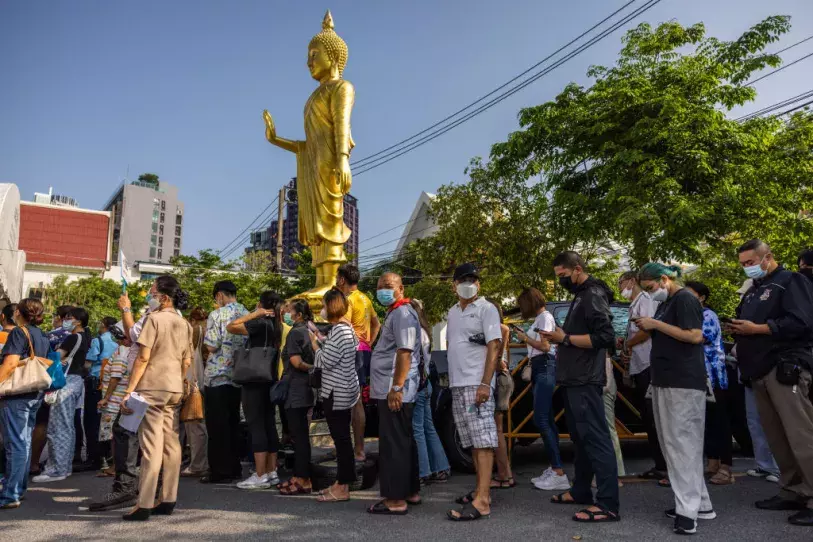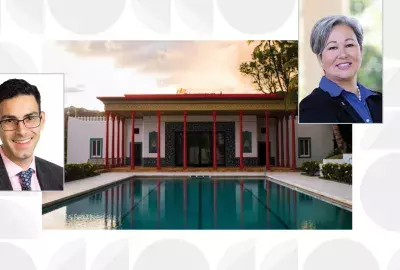
Photo: Early voting in Bangkok. Lauren DeCicca/Getty Images
By Charles E. Morrison and Phanwin Yokying
East-West Center research fellows
Quick take:
- The democratic opposition to Thailand’s current military-dominated government may have a real chance of winning the May 14 parliamentary election.
- Many fear, however, that a landslide victory by reformists could precipitate either another coup by the military similar to neighboring Myanmar, or legal maneuvers to void the election results.
HONOLULU (May 12, 2023) – Thailand’s parliamentary election on May 14 has been largely overshadowed in the global media by the one happening in Turkey on the same day. But as in Turkey, the democratic opposition to Thailand’s current government may have a real chance of winning, with far-reaching consequences.
This could either set Thailand either on a course away from military-dominated rule, or toward a new political crisis and yet another possible coup. And since Thailand, again like Turkey, is a US treaty ally, the election has important implications for future US relations.
Semi-democratic system
The Thai vote is for 500 seats in the lower house of parliament. Of those, 400 will be elected in winner-take-all districts similar to a US election. The remaining 100 will be decided in a separate election for political parties, with each party gaining seats proportional to the votes they receive. These 500 will then join the 250 appointed senators in determining the next government and prime minister.
This semi-democratic voting system was devised by the military leaders of a 2014 coup to ensure their continuing control. In the first post-coup election in 2019, it worked. The opposition Pheu Thai Party (PTP) associated with exiled former populist Prime Minister Thaksin Shinawatra narrowly won the largest number of elected seats, but the senators unanimously voted for the 2014 coup leader, General Prayut Chan-o-cha. Thus, Prayut continued as prime minister in civilian guise.
This time things have changed. Despite questions of reliability, local polls all show the same basic results: Prayut and his government are much more unpopular, in part because of poor economic performance and a lackluster post-covid recovery. Reformist forces appear on the verge of a large victory.
Opposition leading military parties in polls
While Thaksin’s PTP has led the polling fueled by a strong rural support base, there has been a recent surge for the Move Forward Party (MFP), which has a more dynamic image and is especially popular with younger urban voters. MFP is perceived as more firmly opposed to a post-election deal with the military-affiliated parties and more determined to write a new democratic constitution and make fundamental political, social, and economic reforms.
Recent polls suggest that MFP’s leader, 42-year-old Harvard-educated Pita Limjaroenrat, has moved ahead of PTP’s 36-year-old Paetongtarn, Thaksin’s younger daughter, as the preferred next prime minister. MFP may also be approaching the PTP in the party preference voting, although it is not likely to win as many constituency seats.
Meanwhile, none of the pro-military parties are doing well. Polls show that at most 15 percent of voters want Prayut to stay on, and other military-government affiliated candidates poll much lower. The democratic reformists may be able to form a government along with smaller parties, overcoming any senate opposition. Even the Thai senate is no longer firmly united behind Prayut.
Fears of another coup
This might be good news for democracy if it weren’t for the example of neighboring Myanmar, where a huge election victory for democratic forces over military-affiliated party led to a coup in early 2021 and a continuing, vicious civil war. Some fear that a landslide victory by Thai reformists could similarly precipitate either a coup by the military and their allies, or legal maneuvers to void all or part of the election results.
This would bring internal turmoil, international condemnation, and economic repercussions. Certainly, the United States would be forced to condemn any coup, apply economic sanctions, and halt training and exercises with the Thai military. In response, the coup leaders might be tempted to tighten relations with China.
There are many questions that won’t become clear until after the election is over. Will democratic forces win enough seats to form a government? If so, can the PTP and MFP cooperate in devising a common agenda and power-sharing formula, or will Thaksin forces be tempted to look for other partners? Will the military accept being marginalized or even excluded in the post-election political bargaining?
In the longer term, if a reformist government comes into place how can it implement the reforms desired by the voters—including lavish subsidies and other idealistic promises the opposition parties have made—without triggering a military backlash? Thaksin insists he will return to Thailand in July of this year, and, if so, with what consequences?
As vigorously as the Thai parties have been competing in the election, the post-election bargaining among multiple players may be even more consequential, for Thailand and the world.
Photo: Early voting in Bangkok. Lauren DeCicca/Getty Images
By Charles E. Morrison and Phanwin Yokying
East-West Center research fellows
Quick take:
- The democratic opposition to Thailand’s current military-dominated government may have a real chance of winning the May 14 parliamentary election.
- Many fear, however, that a landslide victory by reformists could precipitate either another coup by the military similar to neighboring Myanmar, or legal maneuvers to void the election results.
HONOLULU (May 12, 2023) – Thailand’s parliamentary election on May 14 has been largely overshadowed in the global media by the one happening in Turkey on the same day. But as in Turkey, the democratic opposition to Thailand’s current government may have a real chance of winning, with far-reaching consequences.
This could either set Thailand either on a course away from military-dominated rule, or toward a new political crisis and yet another possible coup. And since Thailand, again like Turkey, is a US treaty ally, the election has important implications for future US relations.
Semi-democratic system
The Thai vote is for 500 seats in the lower house of parliament. Of those, 400 will be elected in winner-take-all districts similar to a US election. The remaining 100 will be decided in a separate election for political parties, with each party gaining seats proportional to the votes they receive. These 500 will then join the 250 appointed senators in determining the next government and prime minister.
This semi-democratic voting system was devised by the military leaders of a 2014 coup to ensure their continuing control. In the first post-coup election in 2019, it worked. The opposition Pheu Thai Party (PTP) associated with exiled former populist Prime Minister Thaksin Shinawatra narrowly won the largest number of elected seats, but the senators unanimously voted for the 2014 coup leader, General Prayut Chan-o-cha. Thus, Prayut continued as prime minister in civilian guise.
This time things have changed. Despite questions of reliability, local polls all show the same basic results: Prayut and his government are much more unpopular, in part because of poor economic performance and a lackluster post-covid recovery. Reformist forces appear on the verge of a large victory.
Opposition leading military parties in polls
While Thaksin’s PTP has led the polling fueled by a strong rural support base, there has been a recent surge for the Move Forward Party (MFP), which has a more dynamic image and is especially popular with younger urban voters. MFP is perceived as more firmly opposed to a post-election deal with the military-affiliated parties and more determined to write a new democratic constitution and make fundamental political, social, and economic reforms.
Recent polls suggest that MFP’s leader, 42-year-old Harvard-educated Pita Limjaroenrat, has moved ahead of PTP’s 36-year-old Paetongtarn, Thaksin’s younger daughter, as the preferred next prime minister. MFP may also be approaching the PTP in the party preference voting, although it is not likely to win as many constituency seats.
Meanwhile, none of the pro-military parties are doing well. Polls show that at most 15 percent of voters want Prayut to stay on, and other military-government affiliated candidates poll much lower. The democratic reformists may be able to form a government along with smaller parties, overcoming any senate opposition. Even the Thai senate is no longer firmly united behind Prayut.
Fears of another coup
This might be good news for democracy if it weren’t for the example of neighboring Myanmar, where a huge election victory for democratic forces over military-affiliated party led to a coup in early 2021 and a continuing, vicious civil war. Some fear that a landslide victory by Thai reformists could similarly precipitate either a coup by the military and their allies, or legal maneuvers to void all or part of the election results.
This would bring internal turmoil, international condemnation, and economic repercussions. Certainly, the United States would be forced to condemn any coup, apply economic sanctions, and halt training and exercises with the Thai military. In response, the coup leaders might be tempted to tighten relations with China.
There are many questions that won’t become clear until after the election is over. Will democratic forces win enough seats to form a government? If so, can the PTP and MFP cooperate in devising a common agenda and power-sharing formula, or will Thaksin forces be tempted to look for other partners? Will the military accept being marginalized or even excluded in the post-election political bargaining?
In the longer term, if a reformist government comes into place how can it implement the reforms desired by the voters—including lavish subsidies and other idealistic promises the opposition parties have made—without triggering a military backlash? Thaksin insists he will return to Thailand in July of this year, and, if so, with what consequences?
As vigorously as the Thai parties have been competing in the election, the post-election bargaining among multiple players may be even more consequential, for Thailand and the world.
East-West Wire
News, Commentary, and Analysis
The East-West Wire is a news, commentary, and analysis service provided by the East-West Center in Honolulu. Any part or all of the Wire content may be used by media with attribution to the East-West Center or the person quoted. To receive East-West Center Wire media releases via email, subscribe here.
For links to all East-West Center media programs, fellowships and services, see www.eastwestcenter.org/journalists.







